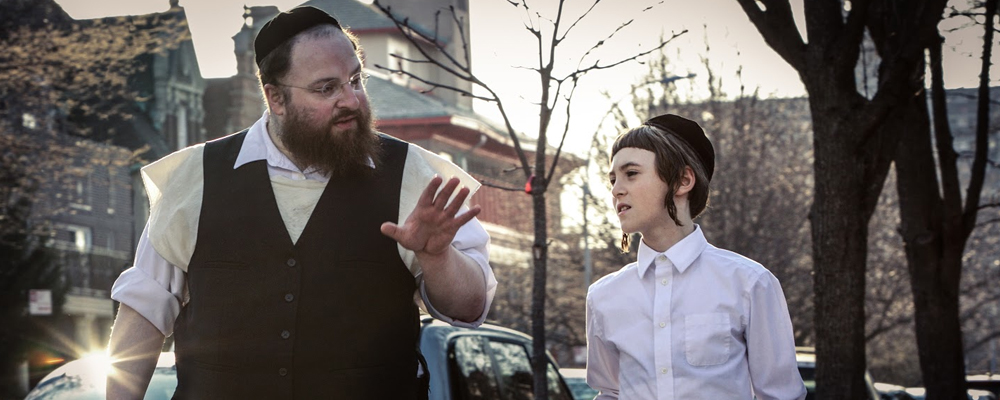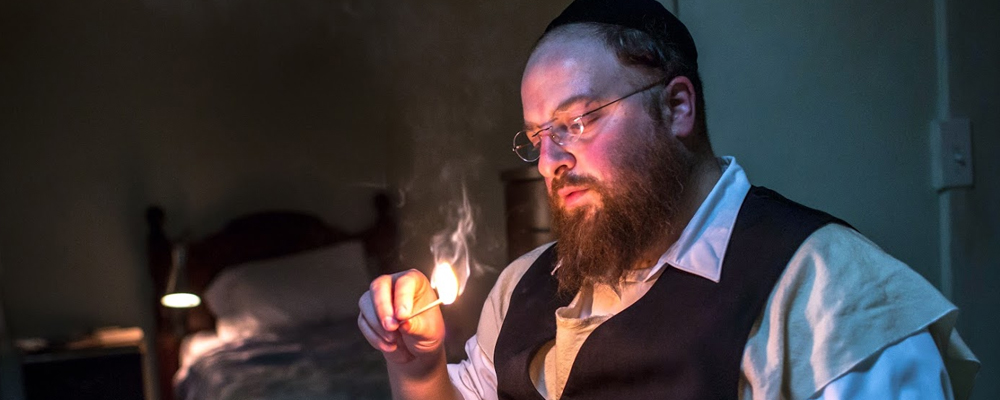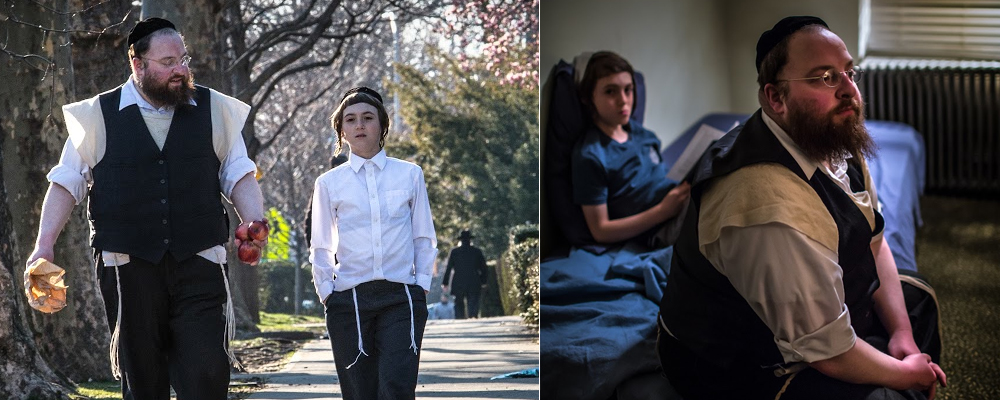Director Joshua Z. Weinstein Pulls Back the Veil on His Yiddish Film ‘Menashe’
Sandra Miska
Before assimilation and World War II, the Yiddish film industry was a thriving one, but both factors eventually brought that slice of cinematic history to a screeching halt. Now, more than 70 years later, documentary filmmaker Joshua Z. Weinstein has revived the genre for his first narrative feature, “Menashe,” a poignant drama set right in New York. The title character (first-time actor Menashe Lustig in an impressive debut) is a Hasidic Jewish man who experienced a significant trauma a year prior to the story. Not only did he lose his wife to an untimely death, but custom in his community dictates that children must be raised in two-parent homes, an unfortunate edict that also costs him his ten-year-old son, Rieven (Ruben Niborski). Despite his tragic life circumstances, there is warmth and humor to be found in his story, as Menashe struggles to maintain a bond with his boy, prove himself as a valuable member of his community, and half-heartedly search for a new wife.
Weinstein recently spoke with Entertainment Voice about the making of this ambitious film, which is partly inspired by Lustig’s own life. He also opened up about how his background in documentaries prepared him to make a feature, and the similarities between Menashe and a certain late Broadway legend he filmed.
You filmed “Menashe” almost entirely in Yiddish, a language you do not speak. What was that experience like?
Making a film, an indie film, is already challenging in all of the known ways. It only made a film like this even more challenging, or almost impossible, because we’re dealing with non-actors in a population that doesn’t want to be involved in movies, and I’m directing in a language that’s not my native language, so everything would take so much longer to do, but it was worthwhile because it was the only way to tell an authentic story.
We blocked and rehearsed every scene in English, so that all the actors and I were on the same page, and then we had the script translated into Yiddish, where then the actors would switch to Yiddish, and I know basic enough Yiddish to know what was going on. We had a translator, like the UN, in another room who was live translating everything that was being said, and a producer was being a script supervisor and making sure everything was correct.
This was the first Yiddish film to be released in 70 years, correct?
Something like that. The funny thing was, the goal wasn’t to make a Yiddish film, it was to make a film that was authentic to the community that I was representing, and if they speak Yiddish at home, then the film had to be in Yiddish. We never thought to second guess that.
You mentioned that it’s set in a very secretive world. How did you go about conducting research?
I spent almost a year researching the film before we started shooting. I spent a lot of time just meeting people, talking to them, going in their religious baths with them, singing, dancing, observing the holidays. So for me it was really to see the total experience and relay that to the movie.
Was there anything that you learned during your research that surprised you?
Everything surprised me. When you make films about communities you don’t know, you have to go in and be ready to receive everything and be willing to put your biases outside the door. For me, cinema is about learning and education, and I was studying this society that I didn’t know anything about.
The lead actor, who is also named Menashe, the story was based on his life. Did you sit down and write the script with him? What was that process like?
It’s the emotional truth of his life. This was a film where we needed non-actors who spoke Yiddish, so I wanted to make sure that the actors I found, I could write parts for them, so immediately when I met Menahse, I was blown away by this Charlie Chaplin-esque clown who also had this deep sadness inside him. He told me two details about this life the first time I met him. One, that he was a widower, and, two, that he lost custody of his son. And this was such a profound concept, and it allowed me to tell this universal story about a father and son, even though the language is something foreign to us, even though the religion is foreign to us, the universalities of being a parent, I could always relate to that.
Did he get back custody of his son in real life?
No, his son lives a few blocks away from him, and he’s still looking for a wife.
Menashe is portrayed as an outsider, but towards the end we see him taking steps to change his life. Do you feel like the character has really conformed, or is he just playing a role?
As a story, I was interested in writing a character who obeys by the rules and obeys by society and never thinks of leaving, never thinks of full rebelling. It’s up to you, the viewer, to decide what his change really means. I know what I think, but I think that there are arguments for multiple interpretations.
What’s next for you? Would you do another Yiddish film, or do you have a different project in mind?
Well, again, this is not a Jewish film, it’s a film about Jews, and I’ve worked my whole life making documentaries about societies all over the world… I’ve always explored all over the world with my camera and use it as a form of learning. So there are other worlds that I want to explore, but I will definitely be doing my next one in English, for sure.
What skills that you acquired as a documentary filmmaker were useful in making your first narrative feature?
The biggest thing is to work with movies, and to understand that you can’t just parachute in and make films. Films are about collaboration. They’re about understanding the communities you’re working with. They’re also about rolling with the punches. With documentaries, you never know what is going to happen every day. You plan your best, and then life sets in. I think being able to be flexible and being able to change with the day, no matter what the story is about, I felt confident that we could make use of our time.
I just watched the Elaine Stritch documentary [“Elaine Stritch: Shoot Me”] that you worked on as a cinematographer. What was that experience like?
Incredible. The funny thing is, Elaine and Menashe are similar, iconoclastic and fiercely independent. They’re both big personalities, they like to joke, but there’s also a deep sadness with both of them. Elaine’s husband died at a young age, and she [was a widow] herself for a long period of her life. With “Elaine,” the difficulty with that was she was dealing with intense diabetes and was a former alcoholic, so she had a lot of issues she was dealing with. She taught me to laugh. No matter how bad life is, you have to bring some joy.
“Menashe” opens July 28 in select theaters.



